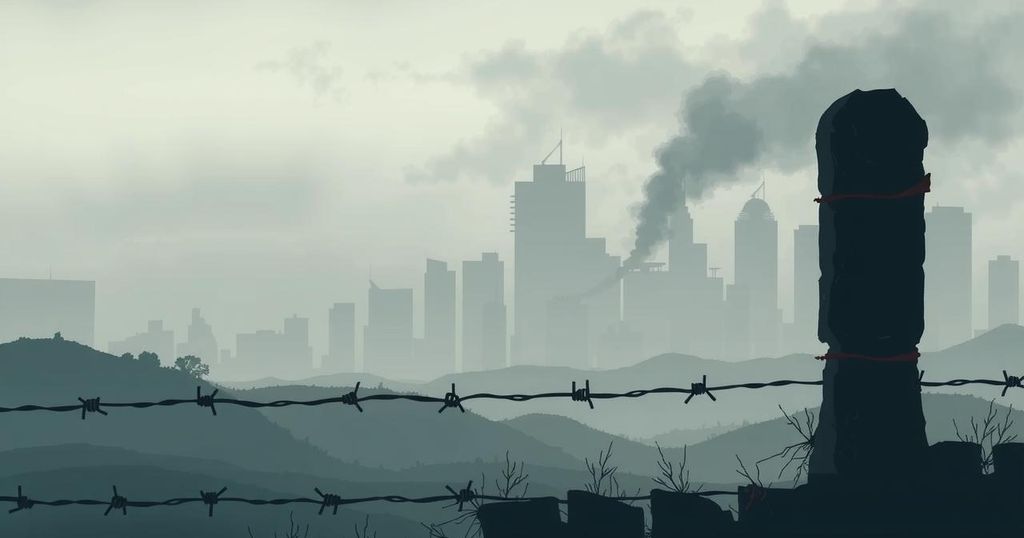M23 Rebels Capture Goma: A Critical Escalation in DRC Conflict
M23 rebels have declared control over Goma, intensifying an already dire humanitarian crisis in eastern DRC. The conflict has seen significant civilian displacement and military confrontations, coupled with accusations of Rwandan support for M23. Tensions between DRC and Rwanda have escalated, prompting calls for diplomatic intervention by regional leaders.
The ongoing conflict in the Democratic Republic of the Congo (DRC) has seen the M23 rebel group declare the city of Goma under its control. This development marks a significant escalation in a long-standing conflict that has resulted in numerous fatalities and displacements of civilians in the eastern DRC. Reports indicate that M23 intensified their offensives leading to Goma’s capture, leading hundreds of thousands to flee the city in fear of violence.
M23, comprised largely of Tutsi fighters, claims to seek rights for the Tutsi minority in the DRC and is alleged to be supported by the Rwandan government, which denies these accusations. The group re-emerged prominently in 2022, escalating its territorial gains against the Congolese army (FARDC) and peacekeeping forces. This situation has been exacerbated by recent clashes and the death of military personnel, further destabilizing the region.
The lead-up to M23’s announcement included the capture of nearby towns and a warning for the Congolese army to surrender. Civilians fleeing to Goma expressed confusion and fear regarding their safety, as gunfire erupted upon M23’s entry. M23 fighters reportedly entered Goma amid heavy gunfire on a recent Sunday night, with many government soldiers surrendering their weapons.
Post-capture, Goma has remained tense with sporadic gunfire reported, signifying ongoing confrontations between M23 and government-aligned forces. Residents observed armed M23 rebels patrolling the area, while some reports indicated looting and violence against infrastructure. Analysts highlighted the complex geography of Goma, suggesting the challenges the DRC army would face in any attempts to retake the city.
The reactions of the DRC and Rwanda governments have been critical, with the Congolese government accusing Rwanda of invasion and declaring a state of emergency. Diplomatic relations between the two nations are strained, following a call for sanctions against Rwanda by DRC officials. The ongoing situation further complicates regional stability, with leaders from the East African Community (EAC) calling for urgent dialogue and intervention to resolve the crisis.
Looking forward, the potential for a ceasefire remains uncertain, as previous ceasefire agreements have been violated. Capturing Goma grants M23 enhanced strategic positioning; analysts predict further hostilities could arise in the region. This capture might exacerbate one of Africa’s protracted conflicts, displacing additional civilians and intensifying diplomatic tensions between key regional players, notably Rwanda and South Africa.
The M23 rebel group, originally formed to address grievances concerning the Tutsi population in the DRC, has resumed violent activities recently after a period of dormancy. Goma, being a crucial city in North Kivu, serves as a strategic point for military and humanitarian efforts. M23 has received accusations from the DRC and the UN regarding Rwandan backing, complicating the political landscape in the region and igniting historical tensions stemming from the Rwandan genocide and subsequent regional conflicts.
The situation in Goma represents a critical juncture in the DRC, with the M23’s capture signaling a potentially transformative phase in the ongoing conflict. The humanitarian implications are dire, with massive displacements expected as violence continues. Diplomatic efforts within the EAC may play a crucial role in addressing these challenges, but the volatile dynamics between involved nations cast doubt on the effectiveness of such initiatives.
Original Source: www.aljazeera.com




Post Comment